Contemporary Challenges in Informed Consent: No Jab No Pay Policy
VerifiedAdded on 2020/05/16
|22
|5419
|63
Report
AI Summary
This report examines the Australian government's No Jab No Pay policy, which mandates child vaccinations for families to receive benefits. The report explores the policy's impact on immunization rates and its challenges, particularly concerning informed consent. It highlights the legal and ethical requirements of informed consent, including language barriers, religious influences, and the vulnerability of certain groups like migrants and those with low socioeconomic status. The report reviews literature on vaccine-preventable diseases, the policy's effect on immunization coverage, and its potential violation of informed consent principles, which should be obtained prior to any medical intervention. It also discusses social inequities, where families in low-income areas may face barriers to vaccination. The report concludes by emphasizing the need for reforms to ensure fair access and protect citizens' rights, advocating for legal consent prior to service delivery and addressing the issue of social inequality.
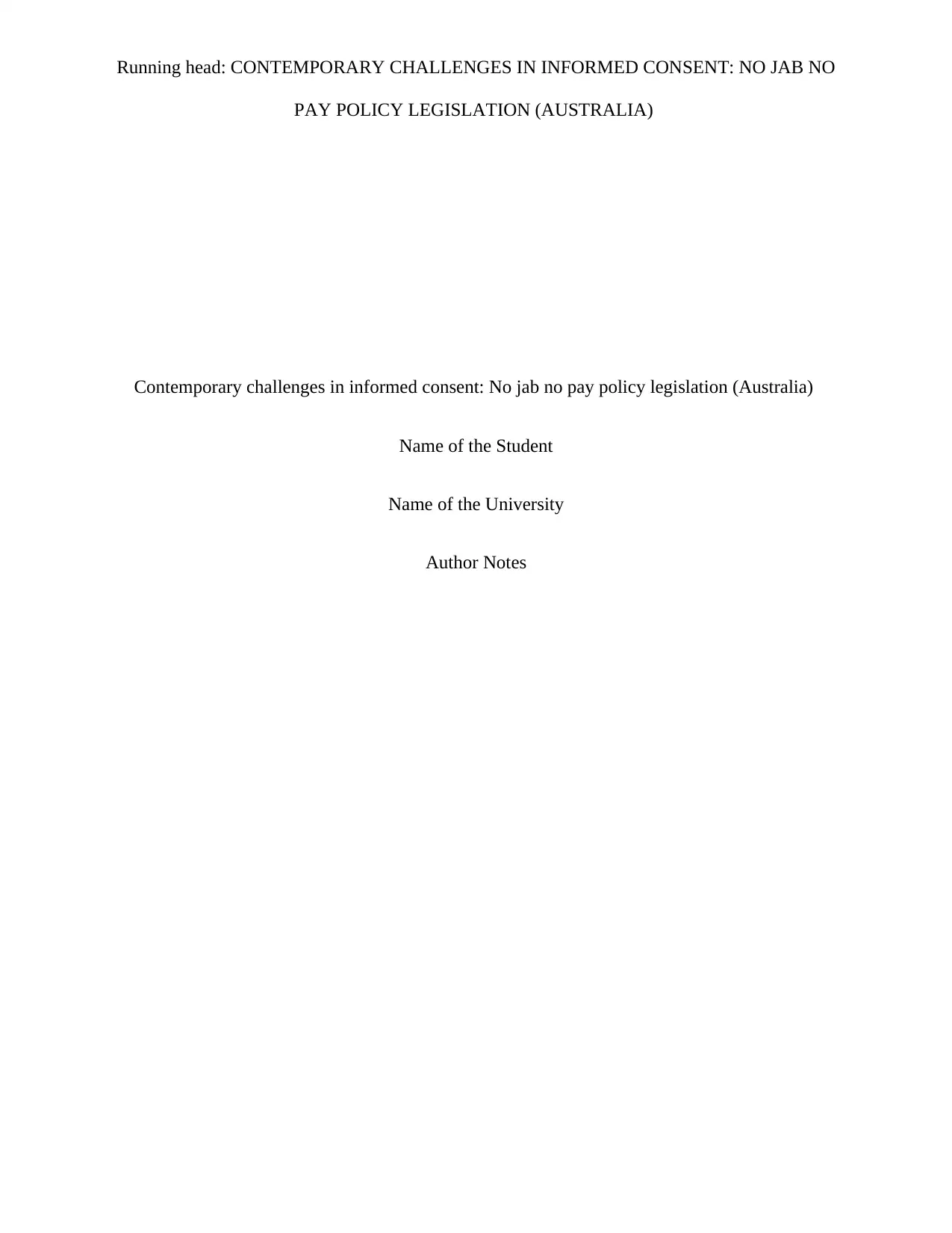
Running head: CONTEMPORARY CHALLENGES IN INFORMED CONSENT: NO JAB NO
PAY POLICY LEGISLATION (AUSTRALIA)
Contemporary challenges in informed consent: No jab no pay policy legislation (Australia)
Name of the Student
Name of the University
Author Notes
PAY POLICY LEGISLATION (AUSTRALIA)
Contemporary challenges in informed consent: No jab no pay policy legislation (Australia)
Name of the Student
Name of the University
Author Notes
Paraphrase This Document
Need a fresh take? Get an instant paraphrase of this document with our AI Paraphraser
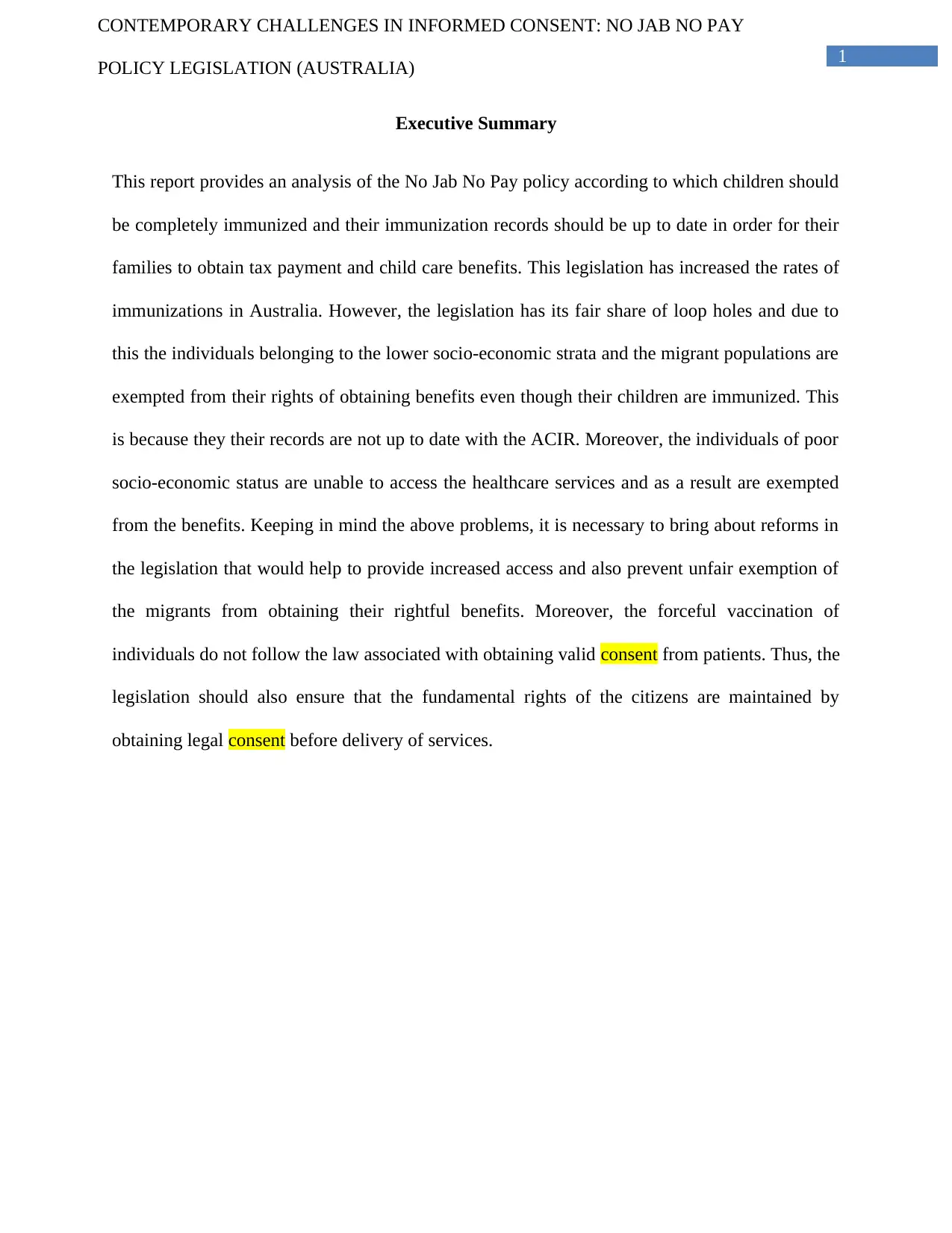
1
CONTEMPORARY CHALLENGES IN INFORMED CONSENT: NO JAB NO PAY
POLICY LEGISLATION (AUSTRALIA)
Executive Summary
This report provides an analysis of the No Jab No Pay policy according to which children should
be completely immunized and their immunization records should be up to date in order for their
families to obtain tax payment and child care benefits. This legislation has increased the rates of
immunizations in Australia. However, the legislation has its fair share of loop holes and due to
this the individuals belonging to the lower socio-economic strata and the migrant populations are
exempted from their rights of obtaining benefits even though their children are immunized. This
is because they their records are not up to date with the ACIR. Moreover, the individuals of poor
socio-economic status are unable to access the healthcare services and as a result are exempted
from the benefits. Keeping in mind the above problems, it is necessary to bring about reforms in
the legislation that would help to provide increased access and also prevent unfair exemption of
the migrants from obtaining their rightful benefits. Moreover, the forceful vaccination of
individuals do not follow the law associated with obtaining valid consent from patients. Thus, the
legislation should also ensure that the fundamental rights of the citizens are maintained by
obtaining legal consent before delivery of services.
CONTEMPORARY CHALLENGES IN INFORMED CONSENT: NO JAB NO PAY
POLICY LEGISLATION (AUSTRALIA)
Executive Summary
This report provides an analysis of the No Jab No Pay policy according to which children should
be completely immunized and their immunization records should be up to date in order for their
families to obtain tax payment and child care benefits. This legislation has increased the rates of
immunizations in Australia. However, the legislation has its fair share of loop holes and due to
this the individuals belonging to the lower socio-economic strata and the migrant populations are
exempted from their rights of obtaining benefits even though their children are immunized. This
is because they their records are not up to date with the ACIR. Moreover, the individuals of poor
socio-economic status are unable to access the healthcare services and as a result are exempted
from the benefits. Keeping in mind the above problems, it is necessary to bring about reforms in
the legislation that would help to provide increased access and also prevent unfair exemption of
the migrants from obtaining their rightful benefits. Moreover, the forceful vaccination of
individuals do not follow the law associated with obtaining valid consent from patients. Thus, the
legislation should also ensure that the fundamental rights of the citizens are maintained by
obtaining legal consent before delivery of services.
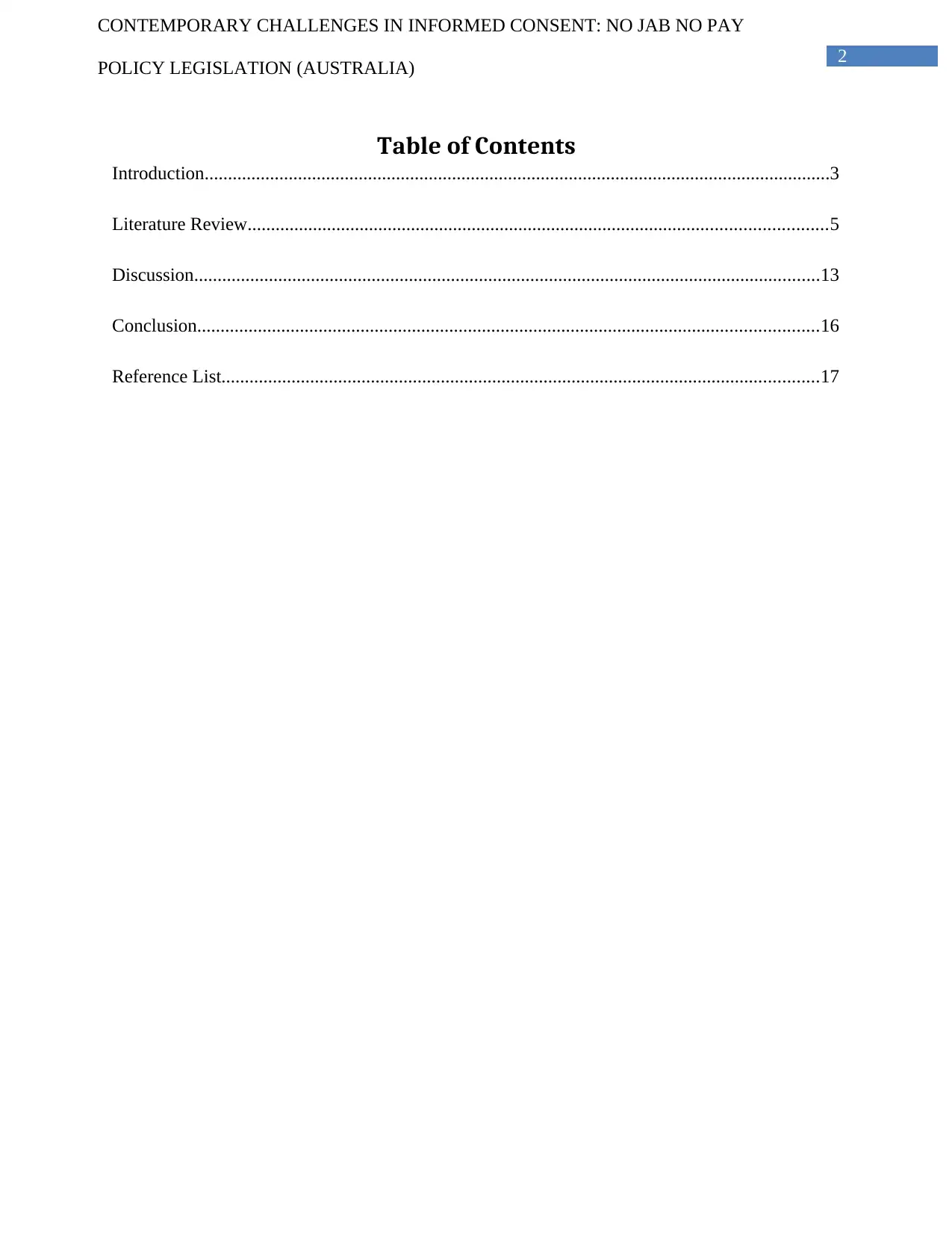
2
CONTEMPORARY CHALLENGES IN INFORMED CONSENT: NO JAB NO PAY
POLICY LEGISLATION (AUSTRALIA)
Table of Contents
Introduction......................................................................................................................................3
Literature Review............................................................................................................................5
Discussion......................................................................................................................................13
Conclusion.....................................................................................................................................16
Reference List................................................................................................................................17
CONTEMPORARY CHALLENGES IN INFORMED CONSENT: NO JAB NO PAY
POLICY LEGISLATION (AUSTRALIA)
Table of Contents
Introduction......................................................................................................................................3
Literature Review............................................................................................................................5
Discussion......................................................................................................................................13
Conclusion.....................................................................................................................................16
Reference List................................................................................................................................17
⊘ This is a preview!⊘
Do you want full access?
Subscribe today to unlock all pages.

Trusted by 1+ million students worldwide
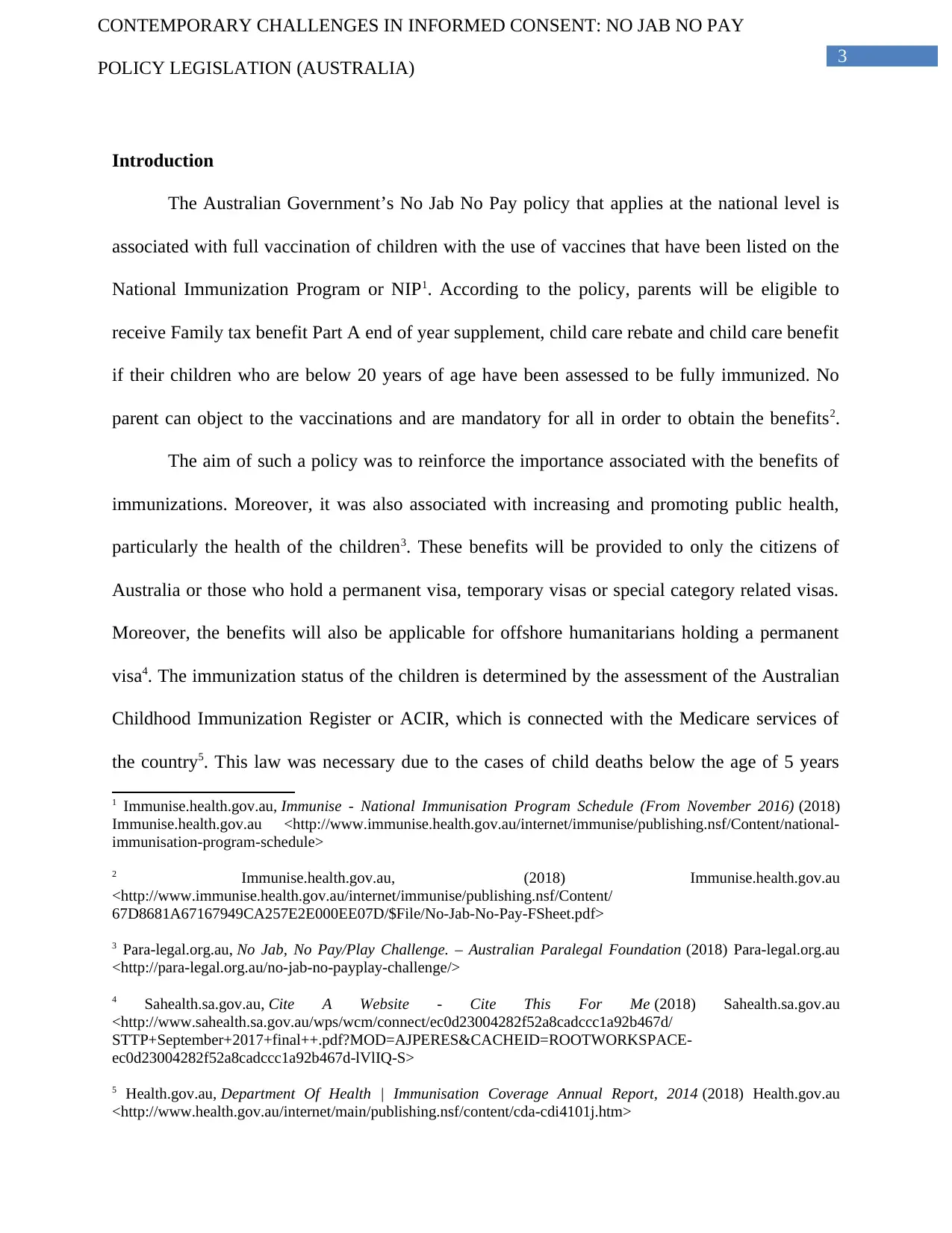
3
CONTEMPORARY CHALLENGES IN INFORMED CONSENT: NO JAB NO PAY
POLICY LEGISLATION (AUSTRALIA)
Introduction
The Australian Government’s No Jab No Pay policy that applies at the national level is
associated with full vaccination of children with the use of vaccines that have been listed on the
National Immunization Program or NIP1. According to the policy, parents will be eligible to
receive Family tax benefit Part A end of year supplement, child care rebate and child care benefit
if their children who are below 20 years of age have been assessed to be fully immunized. No
parent can object to the vaccinations and are mandatory for all in order to obtain the benefits2.
The aim of such a policy was to reinforce the importance associated with the benefits of
immunizations. Moreover, it was also associated with increasing and promoting public health,
particularly the health of the children3. These benefits will be provided to only the citizens of
Australia or those who hold a permanent visa, temporary visas or special category related visas.
Moreover, the benefits will also be applicable for offshore humanitarians holding a permanent
visa4. The immunization status of the children is determined by the assessment of the Australian
Childhood Immunization Register or ACIR, which is connected with the Medicare services of
the country5. This law was necessary due to the cases of child deaths below the age of 5 years
1 Immunise.health.gov.au, Immunise - National Immunisation Program Schedule (From November 2016) (2018)
Immunise.health.gov.au <http://www.immunise.health.gov.au/internet/immunise/publishing.nsf/Content/national-
immunisation-program-schedule>
2 Immunise.health.gov.au, (2018) Immunise.health.gov.au
<http://www.immunise.health.gov.au/internet/immunise/publishing.nsf/Content/
67D8681A67167949CA257E2E000EE07D/$File/No-Jab-No-Pay-FSheet.pdf>
3 Para-legal.org.au, No Jab, No Pay/Play Challenge. – Australian Paralegal Foundation (2018) Para-legal.org.au
<http://para-legal.org.au/no-jab-no-payplay-challenge/>
4 Sahealth.sa.gov.au, Cite A Website - Cite This For Me (2018) Sahealth.sa.gov.au
<http://www.sahealth.sa.gov.au/wps/wcm/connect/ec0d23004282f52a8cadccc1a92b467d/
STTP+September+2017+final++.pdf?MOD=AJPERES&CACHEID=ROOTWORKSPACE-
ec0d23004282f52a8cadccc1a92b467d-lVlIQ-S>
5 Health.gov.au, Department Of Health | Immunisation Coverage Annual Report, 2014 (2018) Health.gov.au
<http://www.health.gov.au/internet/main/publishing.nsf/content/cda-cdi4101j.htm>
CONTEMPORARY CHALLENGES IN INFORMED CONSENT: NO JAB NO PAY
POLICY LEGISLATION (AUSTRALIA)
Introduction
The Australian Government’s No Jab No Pay policy that applies at the national level is
associated with full vaccination of children with the use of vaccines that have been listed on the
National Immunization Program or NIP1. According to the policy, parents will be eligible to
receive Family tax benefit Part A end of year supplement, child care rebate and child care benefit
if their children who are below 20 years of age have been assessed to be fully immunized. No
parent can object to the vaccinations and are mandatory for all in order to obtain the benefits2.
The aim of such a policy was to reinforce the importance associated with the benefits of
immunizations. Moreover, it was also associated with increasing and promoting public health,
particularly the health of the children3. These benefits will be provided to only the citizens of
Australia or those who hold a permanent visa, temporary visas or special category related visas.
Moreover, the benefits will also be applicable for offshore humanitarians holding a permanent
visa4. The immunization status of the children is determined by the assessment of the Australian
Childhood Immunization Register or ACIR, which is connected with the Medicare services of
the country5. This law was necessary due to the cases of child deaths below the age of 5 years
1 Immunise.health.gov.au, Immunise - National Immunisation Program Schedule (From November 2016) (2018)
Immunise.health.gov.au <http://www.immunise.health.gov.au/internet/immunise/publishing.nsf/Content/national-
immunisation-program-schedule>
2 Immunise.health.gov.au, (2018) Immunise.health.gov.au
<http://www.immunise.health.gov.au/internet/immunise/publishing.nsf/Content/
67D8681A67167949CA257E2E000EE07D/$File/No-Jab-No-Pay-FSheet.pdf>
3 Para-legal.org.au, No Jab, No Pay/Play Challenge. – Australian Paralegal Foundation (2018) Para-legal.org.au
<http://para-legal.org.au/no-jab-no-payplay-challenge/>
4 Sahealth.sa.gov.au, Cite A Website - Cite This For Me (2018) Sahealth.sa.gov.au
<http://www.sahealth.sa.gov.au/wps/wcm/connect/ec0d23004282f52a8cadccc1a92b467d/
STTP+September+2017+final++.pdf?MOD=AJPERES&CACHEID=ROOTWORKSPACE-
ec0d23004282f52a8cadccc1a92b467d-lVlIQ-S>
5 Health.gov.au, Department Of Health | Immunisation Coverage Annual Report, 2014 (2018) Health.gov.au
<http://www.health.gov.au/internet/main/publishing.nsf/content/cda-cdi4101j.htm>
Paraphrase This Document
Need a fresh take? Get an instant paraphrase of this document with our AI Paraphraser
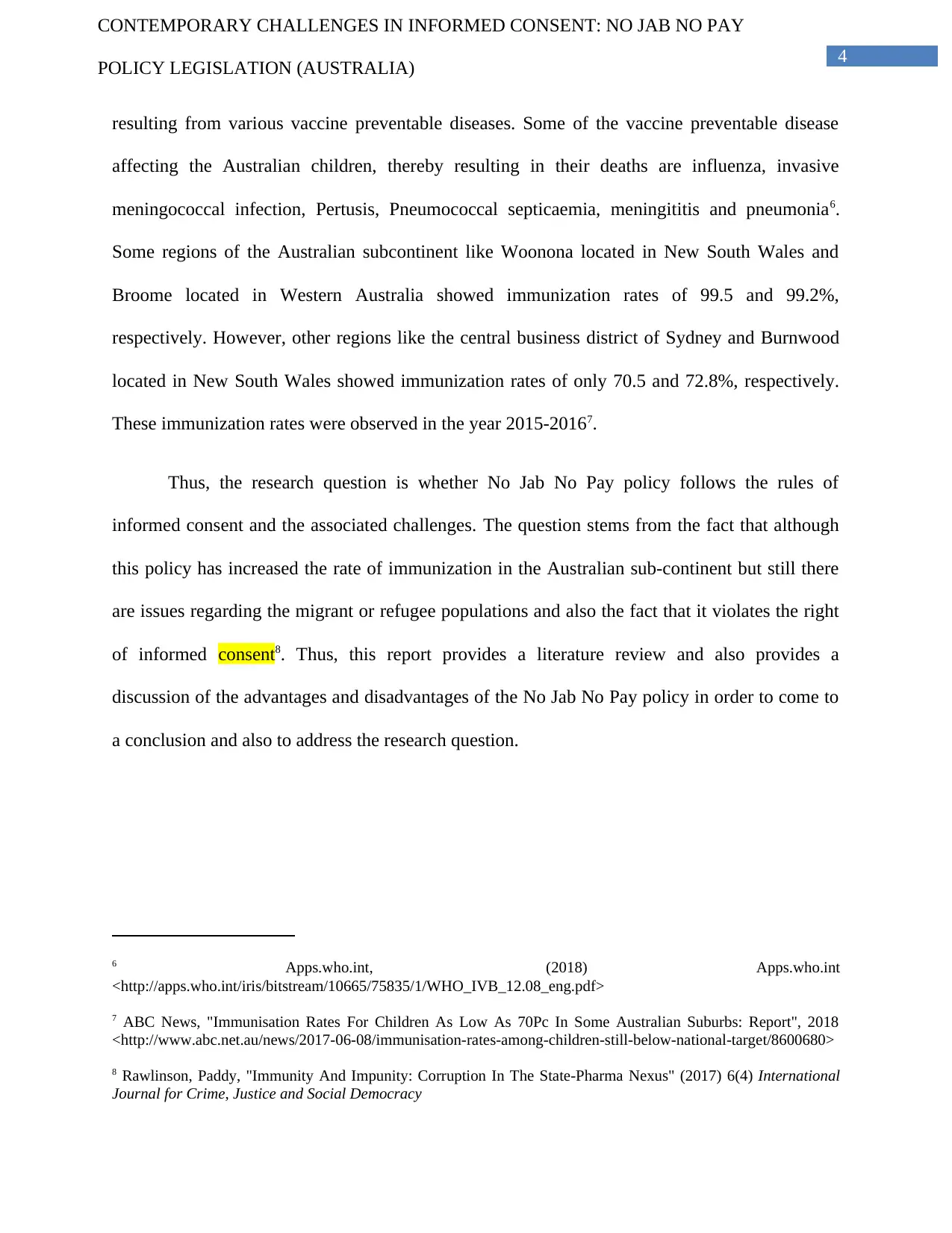
4
CONTEMPORARY CHALLENGES IN INFORMED CONSENT: NO JAB NO PAY
POLICY LEGISLATION (AUSTRALIA)
resulting from various vaccine preventable diseases. Some of the vaccine preventable disease
affecting the Australian children, thereby resulting in their deaths are influenza, invasive
meningococcal infection, Pertusis, Pneumococcal septicaemia, meningititis and pneumonia6.
Some regions of the Australian subcontinent like Woonona located in New South Wales and
Broome located in Western Australia showed immunization rates of 99.5 and 99.2%,
respectively. However, other regions like the central business district of Sydney and Burnwood
located in New South Wales showed immunization rates of only 70.5 and 72.8%, respectively.
These immunization rates were observed in the year 2015-20167.
Thus, the research question is whether No Jab No Pay policy follows the rules of
informed consent and the associated challenges. The question stems from the fact that although
this policy has increased the rate of immunization in the Australian sub-continent but still there
are issues regarding the migrant or refugee populations and also the fact that it violates the right
of informed consent8. Thus, this report provides a literature review and also provides a
discussion of the advantages and disadvantages of the No Jab No Pay policy in order to come to
a conclusion and also to address the research question.
6 Apps.who.int, (2018) Apps.who.int
<http://apps.who.int/iris/bitstream/10665/75835/1/WHO_IVB_12.08_eng.pdf>
7 ABC News, "Immunisation Rates For Children As Low As 70Pc In Some Australian Suburbs: Report", 2018
<http://www.abc.net.au/news/2017-06-08/immunisation-rates-among-children-still-below-national-target/8600680>
8 Rawlinson, Paddy, "Immunity And Impunity: Corruption In The State-Pharma Nexus" (2017) 6(4) International
Journal for Crime, Justice and Social Democracy
CONTEMPORARY CHALLENGES IN INFORMED CONSENT: NO JAB NO PAY
POLICY LEGISLATION (AUSTRALIA)
resulting from various vaccine preventable diseases. Some of the vaccine preventable disease
affecting the Australian children, thereby resulting in their deaths are influenza, invasive
meningococcal infection, Pertusis, Pneumococcal septicaemia, meningititis and pneumonia6.
Some regions of the Australian subcontinent like Woonona located in New South Wales and
Broome located in Western Australia showed immunization rates of 99.5 and 99.2%,
respectively. However, other regions like the central business district of Sydney and Burnwood
located in New South Wales showed immunization rates of only 70.5 and 72.8%, respectively.
These immunization rates were observed in the year 2015-20167.
Thus, the research question is whether No Jab No Pay policy follows the rules of
informed consent and the associated challenges. The question stems from the fact that although
this policy has increased the rate of immunization in the Australian sub-continent but still there
are issues regarding the migrant or refugee populations and also the fact that it violates the right
of informed consent8. Thus, this report provides a literature review and also provides a
discussion of the advantages and disadvantages of the No Jab No Pay policy in order to come to
a conclusion and also to address the research question.
6 Apps.who.int, (2018) Apps.who.int
<http://apps.who.int/iris/bitstream/10665/75835/1/WHO_IVB_12.08_eng.pdf>
7 ABC News, "Immunisation Rates For Children As Low As 70Pc In Some Australian Suburbs: Report", 2018
<http://www.abc.net.au/news/2017-06-08/immunisation-rates-among-children-still-below-national-target/8600680>
8 Rawlinson, Paddy, "Immunity And Impunity: Corruption In The State-Pharma Nexus" (2017) 6(4) International
Journal for Crime, Justice and Social Democracy
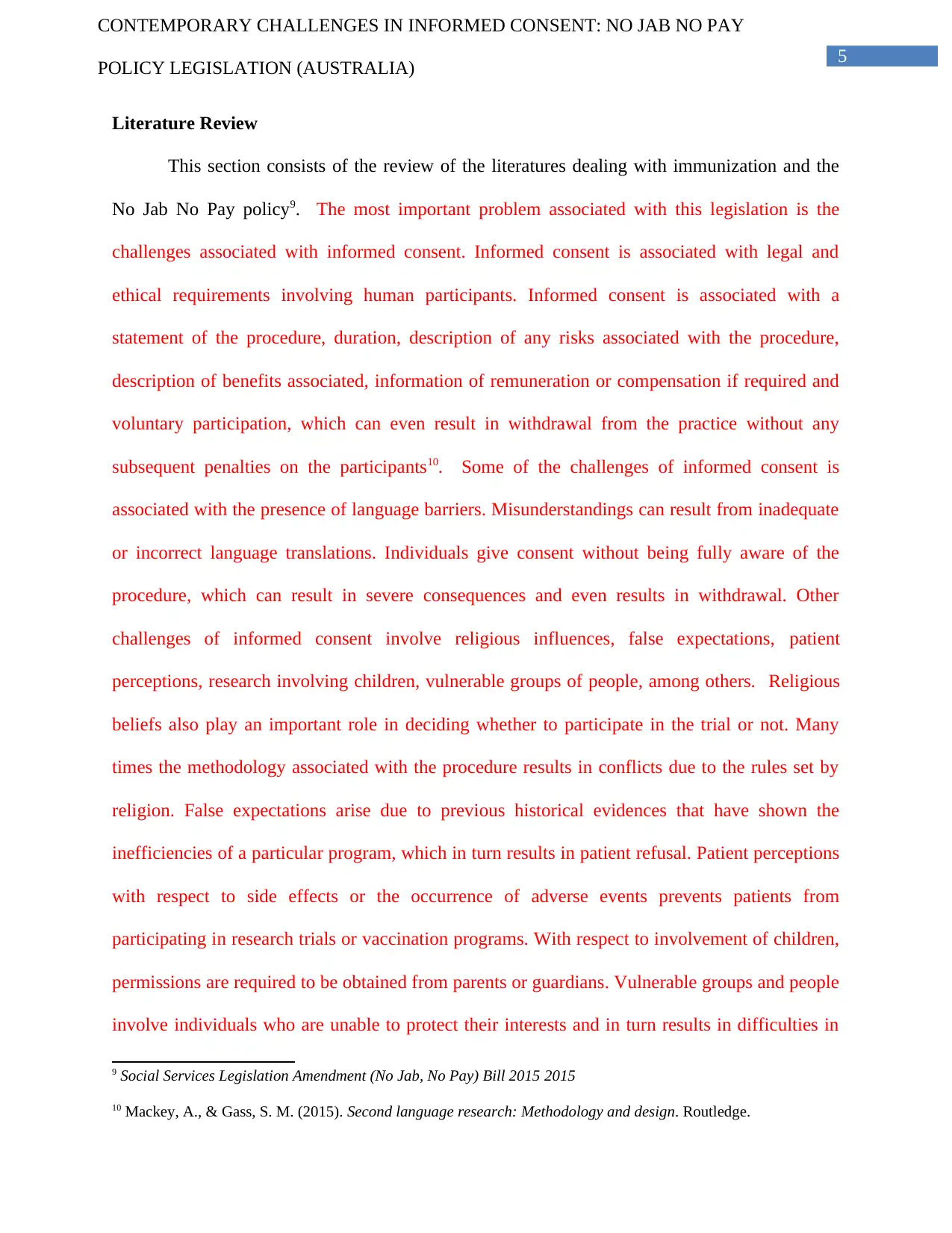
5
CONTEMPORARY CHALLENGES IN INFORMED CONSENT: NO JAB NO PAY
POLICY LEGISLATION (AUSTRALIA)
Literature Review
This section consists of the review of the literatures dealing with immunization and the
No Jab No Pay policy9. The most important problem associated with this legislation is the
challenges associated with informed consent. Informed consent is associated with legal and
ethical requirements involving human participants. Informed consent is associated with a
statement of the procedure, duration, description of any risks associated with the procedure,
description of benefits associated, information of remuneration or compensation if required and
voluntary participation, which can even result in withdrawal from the practice without any
subsequent penalties on the participants10. Some of the challenges of informed consent is
associated with the presence of language barriers. Misunderstandings can result from inadequate
or incorrect language translations. Individuals give consent without being fully aware of the
procedure, which can result in severe consequences and even results in withdrawal. Other
challenges of informed consent involve religious influences, false expectations, patient
perceptions, research involving children, vulnerable groups of people, among others. Religious
beliefs also play an important role in deciding whether to participate in the trial or not. Many
times the methodology associated with the procedure results in conflicts due to the rules set by
religion. False expectations arise due to previous historical evidences that have shown the
inefficiencies of a particular program, which in turn results in patient refusal. Patient perceptions
with respect to side effects or the occurrence of adverse events prevents patients from
participating in research trials or vaccination programs. With respect to involvement of children,
permissions are required to be obtained from parents or guardians. Vulnerable groups and people
involve individuals who are unable to protect their interests and in turn results in difficulties in
9 Social Services Legislation Amendment (No Jab, No Pay) Bill 2015 2015
10 Mackey, A., & Gass, S. M. (2015). Second language research: Methodology and design. Routledge.
CONTEMPORARY CHALLENGES IN INFORMED CONSENT: NO JAB NO PAY
POLICY LEGISLATION (AUSTRALIA)
Literature Review
This section consists of the review of the literatures dealing with immunization and the
No Jab No Pay policy9. The most important problem associated with this legislation is the
challenges associated with informed consent. Informed consent is associated with legal and
ethical requirements involving human participants. Informed consent is associated with a
statement of the procedure, duration, description of any risks associated with the procedure,
description of benefits associated, information of remuneration or compensation if required and
voluntary participation, which can even result in withdrawal from the practice without any
subsequent penalties on the participants10. Some of the challenges of informed consent is
associated with the presence of language barriers. Misunderstandings can result from inadequate
or incorrect language translations. Individuals give consent without being fully aware of the
procedure, which can result in severe consequences and even results in withdrawal. Other
challenges of informed consent involve religious influences, false expectations, patient
perceptions, research involving children, vulnerable groups of people, among others. Religious
beliefs also play an important role in deciding whether to participate in the trial or not. Many
times the methodology associated with the procedure results in conflicts due to the rules set by
religion. False expectations arise due to previous historical evidences that have shown the
inefficiencies of a particular program, which in turn results in patient refusal. Patient perceptions
with respect to side effects or the occurrence of adverse events prevents patients from
participating in research trials or vaccination programs. With respect to involvement of children,
permissions are required to be obtained from parents or guardians. Vulnerable groups and people
involve individuals who are unable to protect their interests and in turn results in difficulties in
9 Social Services Legislation Amendment (No Jab, No Pay) Bill 2015 2015
10 Mackey, A., & Gass, S. M. (2015). Second language research: Methodology and design. Routledge.
⊘ This is a preview!⊘
Do you want full access?
Subscribe today to unlock all pages.

Trusted by 1+ million students worldwide
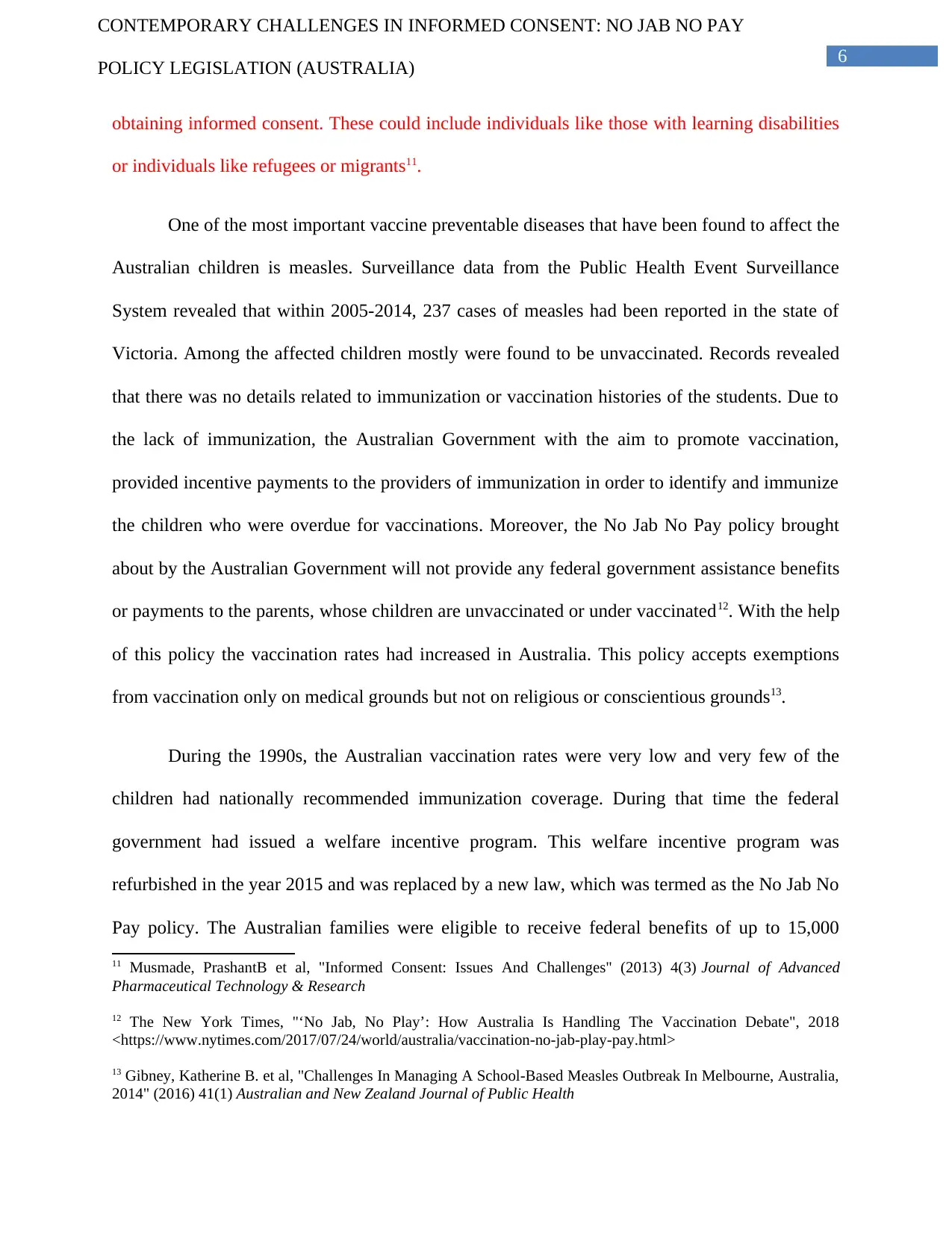
6
CONTEMPORARY CHALLENGES IN INFORMED CONSENT: NO JAB NO PAY
POLICY LEGISLATION (AUSTRALIA)
obtaining informed consent. These could include individuals like those with learning disabilities
or individuals like refugees or migrants11.
One of the most important vaccine preventable diseases that have been found to affect the
Australian children is measles. Surveillance data from the Public Health Event Surveillance
System revealed that within 2005-2014, 237 cases of measles had been reported in the state of
Victoria. Among the affected children mostly were found to be unvaccinated. Records revealed
that there was no details related to immunization or vaccination histories of the students. Due to
the lack of immunization, the Australian Government with the aim to promote vaccination,
provided incentive payments to the providers of immunization in order to identify and immunize
the children who were overdue for vaccinations. Moreover, the No Jab No Pay policy brought
about by the Australian Government will not provide any federal government assistance benefits
or payments to the parents, whose children are unvaccinated or under vaccinated12. With the help
of this policy the vaccination rates had increased in Australia. This policy accepts exemptions
from vaccination only on medical grounds but not on religious or conscientious grounds13.
During the 1990s, the Australian vaccination rates were very low and very few of the
children had nationally recommended immunization coverage. During that time the federal
government had issued a welfare incentive program. This welfare incentive program was
refurbished in the year 2015 and was replaced by a new law, which was termed as the No Jab No
Pay policy. The Australian families were eligible to receive federal benefits of up to 15,000
11 Musmade, PrashantB et al, "Informed Consent: Issues And Challenges" (2013) 4(3) Journal of Advanced
Pharmaceutical Technology & Research
12 The New York Times, "‘No Jab, No Play’: How Australia Is Handling The Vaccination Debate", 2018
<https://www.nytimes.com/2017/07/24/world/australia/vaccination-no-jab-play-pay.html>
13 Gibney, Katherine B. et al, "Challenges In Managing A School-Based Measles Outbreak In Melbourne, Australia,
2014" (2016) 41(1) Australian and New Zealand Journal of Public Health
CONTEMPORARY CHALLENGES IN INFORMED CONSENT: NO JAB NO PAY
POLICY LEGISLATION (AUSTRALIA)
obtaining informed consent. These could include individuals like those with learning disabilities
or individuals like refugees or migrants11.
One of the most important vaccine preventable diseases that have been found to affect the
Australian children is measles. Surveillance data from the Public Health Event Surveillance
System revealed that within 2005-2014, 237 cases of measles had been reported in the state of
Victoria. Among the affected children mostly were found to be unvaccinated. Records revealed
that there was no details related to immunization or vaccination histories of the students. Due to
the lack of immunization, the Australian Government with the aim to promote vaccination,
provided incentive payments to the providers of immunization in order to identify and immunize
the children who were overdue for vaccinations. Moreover, the No Jab No Pay policy brought
about by the Australian Government will not provide any federal government assistance benefits
or payments to the parents, whose children are unvaccinated or under vaccinated12. With the help
of this policy the vaccination rates had increased in Australia. This policy accepts exemptions
from vaccination only on medical grounds but not on religious or conscientious grounds13.
During the 1990s, the Australian vaccination rates were very low and very few of the
children had nationally recommended immunization coverage. During that time the federal
government had issued a welfare incentive program. This welfare incentive program was
refurbished in the year 2015 and was replaced by a new law, which was termed as the No Jab No
Pay policy. The Australian families were eligible to receive federal benefits of up to 15,000
11 Musmade, PrashantB et al, "Informed Consent: Issues And Challenges" (2013) 4(3) Journal of Advanced
Pharmaceutical Technology & Research
12 The New York Times, "‘No Jab, No Play’: How Australia Is Handling The Vaccination Debate", 2018
<https://www.nytimes.com/2017/07/24/world/australia/vaccination-no-jab-play-pay.html>
13 Gibney, Katherine B. et al, "Challenges In Managing A School-Based Measles Outbreak In Melbourne, Australia,
2014" (2016) 41(1) Australian and New Zealand Journal of Public Health
Paraphrase This Document
Need a fresh take? Get an instant paraphrase of this document with our AI Paraphraser
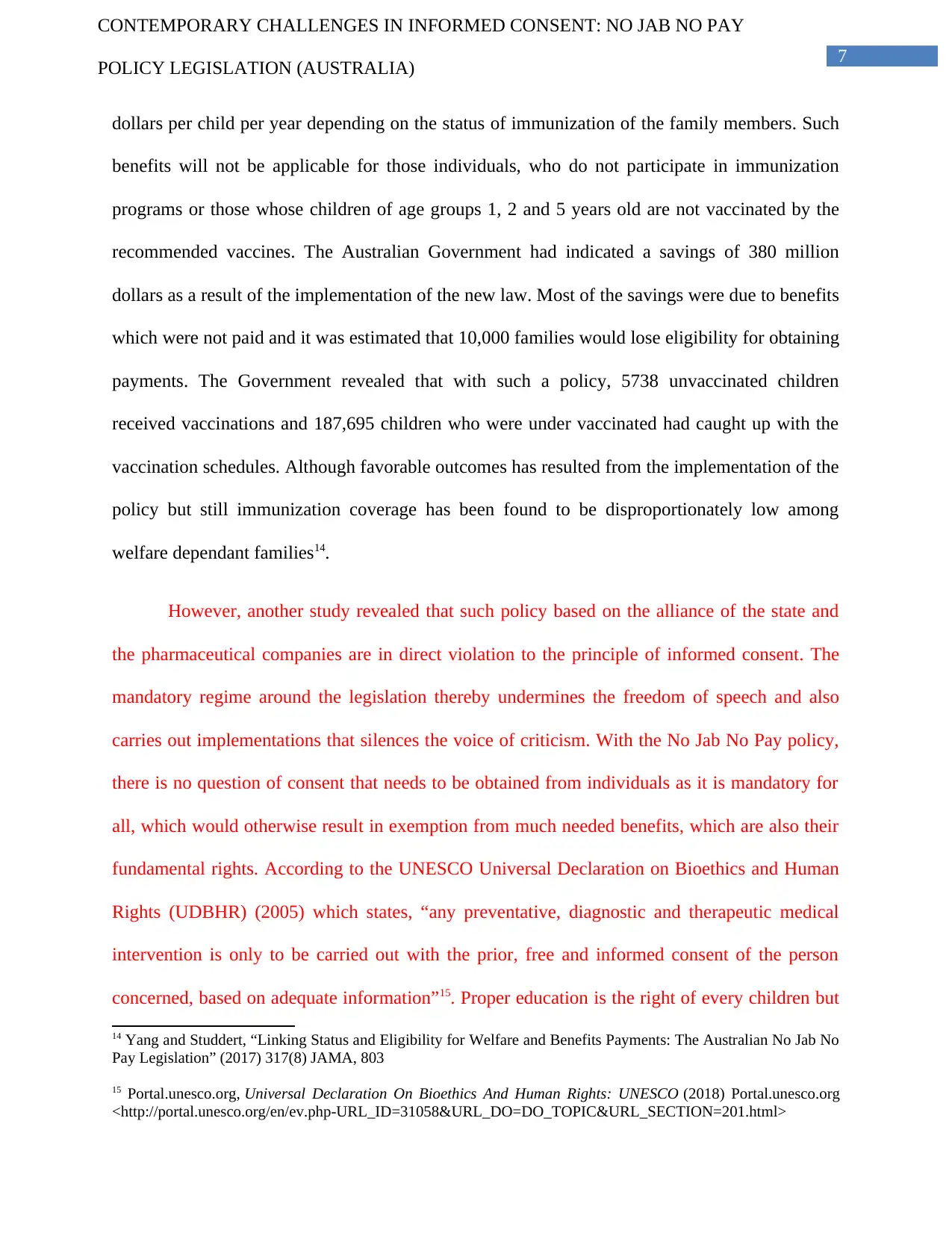
7
CONTEMPORARY CHALLENGES IN INFORMED CONSENT: NO JAB NO PAY
POLICY LEGISLATION (AUSTRALIA)
dollars per child per year depending on the status of immunization of the family members. Such
benefits will not be applicable for those individuals, who do not participate in immunization
programs or those whose children of age groups 1, 2 and 5 years old are not vaccinated by the
recommended vaccines. The Australian Government had indicated a savings of 380 million
dollars as a result of the implementation of the new law. Most of the savings were due to benefits
which were not paid and it was estimated that 10,000 families would lose eligibility for obtaining
payments. The Government revealed that with such a policy, 5738 unvaccinated children
received vaccinations and 187,695 children who were under vaccinated had caught up with the
vaccination schedules. Although favorable outcomes has resulted from the implementation of the
policy but still immunization coverage has been found to be disproportionately low among
welfare dependant families14.
However, another study revealed that such policy based on the alliance of the state and
the pharmaceutical companies are in direct violation to the principle of informed consent. The
mandatory regime around the legislation thereby undermines the freedom of speech and also
carries out implementations that silences the voice of criticism. With the No Jab No Pay policy,
there is no question of consent that needs to be obtained from individuals as it is mandatory for
all, which would otherwise result in exemption from much needed benefits, which are also their
fundamental rights. According to the UNESCO Universal Declaration on Bioethics and Human
Rights (UDBHR) (2005) which states, “any preventative, diagnostic and therapeutic medical
intervention is only to be carried out with the prior, free and informed consent of the person
concerned, based on adequate information”15. Proper education is the right of every children but
14 Yang and Studdert, “Linking Status and Eligibility for Welfare and Benefits Payments: The Australian No Jab No
Pay Legislation” (2017) 317(8) JAMA, 803
15 Portal.unesco.org, Universal Declaration On Bioethics And Human Rights: UNESCO (2018) Portal.unesco.org
<http://portal.unesco.org/en/ev.php-URL_ID=31058&URL_DO=DO_TOPIC&URL_SECTION=201.html>
CONTEMPORARY CHALLENGES IN INFORMED CONSENT: NO JAB NO PAY
POLICY LEGISLATION (AUSTRALIA)
dollars per child per year depending on the status of immunization of the family members. Such
benefits will not be applicable for those individuals, who do not participate in immunization
programs or those whose children of age groups 1, 2 and 5 years old are not vaccinated by the
recommended vaccines. The Australian Government had indicated a savings of 380 million
dollars as a result of the implementation of the new law. Most of the savings were due to benefits
which were not paid and it was estimated that 10,000 families would lose eligibility for obtaining
payments. The Government revealed that with such a policy, 5738 unvaccinated children
received vaccinations and 187,695 children who were under vaccinated had caught up with the
vaccination schedules. Although favorable outcomes has resulted from the implementation of the
policy but still immunization coverage has been found to be disproportionately low among
welfare dependant families14.
However, another study revealed that such policy based on the alliance of the state and
the pharmaceutical companies are in direct violation to the principle of informed consent. The
mandatory regime around the legislation thereby undermines the freedom of speech and also
carries out implementations that silences the voice of criticism. With the No Jab No Pay policy,
there is no question of consent that needs to be obtained from individuals as it is mandatory for
all, which would otherwise result in exemption from much needed benefits, which are also their
fundamental rights. According to the UNESCO Universal Declaration on Bioethics and Human
Rights (UDBHR) (2005) which states, “any preventative, diagnostic and therapeutic medical
intervention is only to be carried out with the prior, free and informed consent of the person
concerned, based on adequate information”15. Proper education is the right of every children but
14 Yang and Studdert, “Linking Status and Eligibility for Welfare and Benefits Payments: The Australian No Jab No
Pay Legislation” (2017) 317(8) JAMA, 803
15 Portal.unesco.org, Universal Declaration On Bioethics And Human Rights: UNESCO (2018) Portal.unesco.org
<http://portal.unesco.org/en/ev.php-URL_ID=31058&URL_DO=DO_TOPIC&URL_SECTION=201.html>
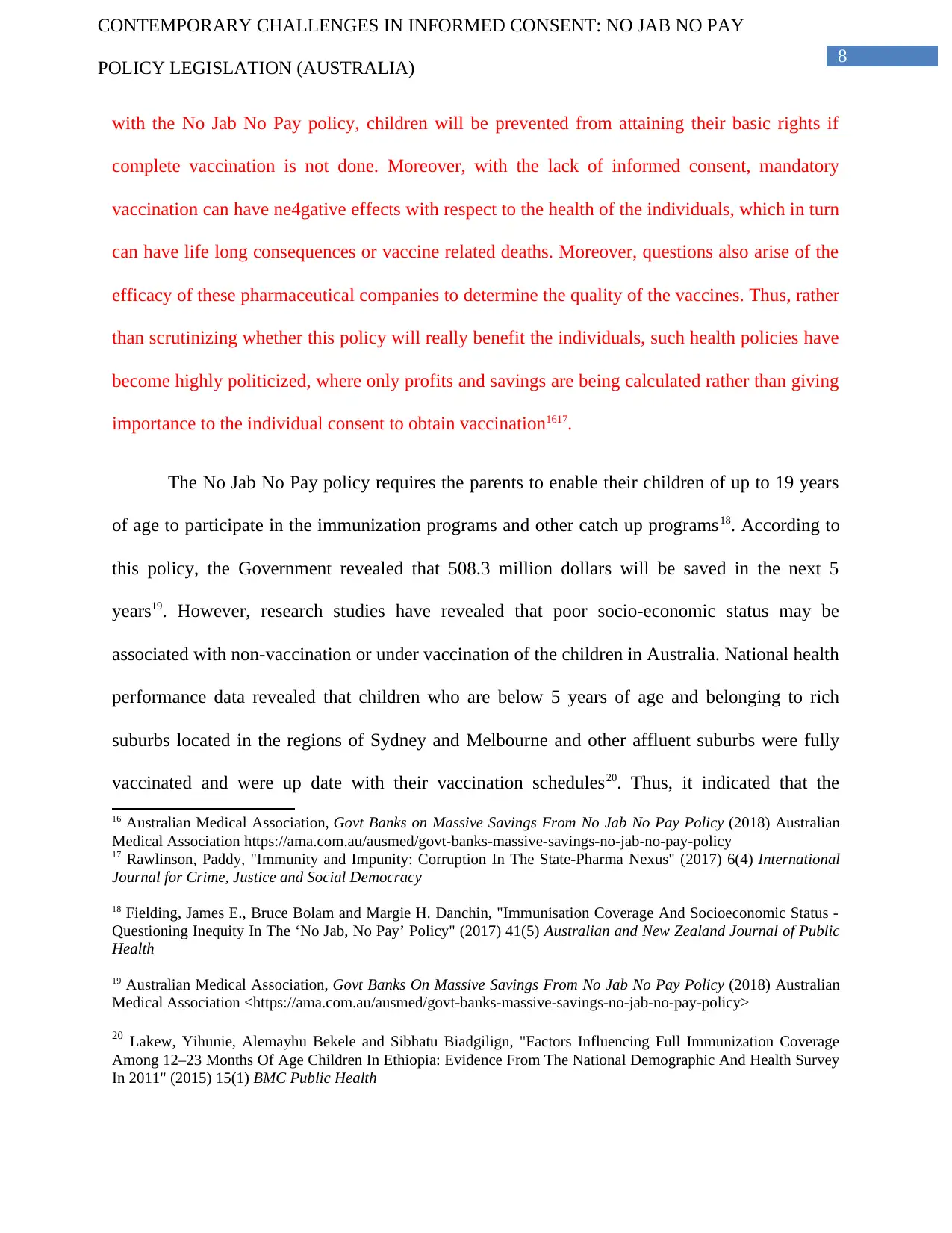
8
CONTEMPORARY CHALLENGES IN INFORMED CONSENT: NO JAB NO PAY
POLICY LEGISLATION (AUSTRALIA)
with the No Jab No Pay policy, children will be prevented from attaining their basic rights if
complete vaccination is not done. Moreover, with the lack of informed consent, mandatory
vaccination can have ne4gative effects with respect to the health of the individuals, which in turn
can have life long consequences or vaccine related deaths. Moreover, questions also arise of the
efficacy of these pharmaceutical companies to determine the quality of the vaccines. Thus, rather
than scrutinizing whether this policy will really benefit the individuals, such health policies have
become highly politicized, where only profits and savings are being calculated rather than giving
importance to the individual consent to obtain vaccination1617.
The No Jab No Pay policy requires the parents to enable their children of up to 19 years
of age to participate in the immunization programs and other catch up programs18. According to
this policy, the Government revealed that 508.3 million dollars will be saved in the next 5
years19. However, research studies have revealed that poor socio-economic status may be
associated with non-vaccination or under vaccination of the children in Australia. National health
performance data revealed that children who are below 5 years of age and belonging to rich
suburbs located in the regions of Sydney and Melbourne and other affluent suburbs were fully
vaccinated and were up date with their vaccination schedules20. Thus, it indicated that the
16 Australian Medical Association, Govt Banks on Massive Savings From No Jab No Pay Policy (2018) Australian
Medical Association https://ama.com.au/ausmed/govt-banks-massive-savings-no-jab-no-pay-policy
17 Rawlinson, Paddy, "Immunity and Impunity: Corruption In The State-Pharma Nexus" (2017) 6(4) International
Journal for Crime, Justice and Social Democracy
18 Fielding, James E., Bruce Bolam and Margie H. Danchin, "Immunisation Coverage And Socioeconomic Status -
Questioning Inequity In The ‘No Jab, No Pay’ Policy" (2017) 41(5) Australian and New Zealand Journal of Public
Health
19 Australian Medical Association, Govt Banks On Massive Savings From No Jab No Pay Policy (2018) Australian
Medical Association <https://ama.com.au/ausmed/govt-banks-massive-savings-no-jab-no-pay-policy>
20 Lakew, Yihunie, Alemayhu Bekele and Sibhatu Biadgilign, "Factors Influencing Full Immunization Coverage
Among 12–23 Months Of Age Children In Ethiopia: Evidence From The National Demographic And Health Survey
In 2011" (2015) 15(1) BMC Public Health
CONTEMPORARY CHALLENGES IN INFORMED CONSENT: NO JAB NO PAY
POLICY LEGISLATION (AUSTRALIA)
with the No Jab No Pay policy, children will be prevented from attaining their basic rights if
complete vaccination is not done. Moreover, with the lack of informed consent, mandatory
vaccination can have ne4gative effects with respect to the health of the individuals, which in turn
can have life long consequences or vaccine related deaths. Moreover, questions also arise of the
efficacy of these pharmaceutical companies to determine the quality of the vaccines. Thus, rather
than scrutinizing whether this policy will really benefit the individuals, such health policies have
become highly politicized, where only profits and savings are being calculated rather than giving
importance to the individual consent to obtain vaccination1617.
The No Jab No Pay policy requires the parents to enable their children of up to 19 years
of age to participate in the immunization programs and other catch up programs18. According to
this policy, the Government revealed that 508.3 million dollars will be saved in the next 5
years19. However, research studies have revealed that poor socio-economic status may be
associated with non-vaccination or under vaccination of the children in Australia. National health
performance data revealed that children who are below 5 years of age and belonging to rich
suburbs located in the regions of Sydney and Melbourne and other affluent suburbs were fully
vaccinated and were up date with their vaccination schedules20. Thus, it indicated that the
16 Australian Medical Association, Govt Banks on Massive Savings From No Jab No Pay Policy (2018) Australian
Medical Association https://ama.com.au/ausmed/govt-banks-massive-savings-no-jab-no-pay-policy
17 Rawlinson, Paddy, "Immunity and Impunity: Corruption In The State-Pharma Nexus" (2017) 6(4) International
Journal for Crime, Justice and Social Democracy
18 Fielding, James E., Bruce Bolam and Margie H. Danchin, "Immunisation Coverage And Socioeconomic Status -
Questioning Inequity In The ‘No Jab, No Pay’ Policy" (2017) 41(5) Australian and New Zealand Journal of Public
Health
19 Australian Medical Association, Govt Banks On Massive Savings From No Jab No Pay Policy (2018) Australian
Medical Association <https://ama.com.au/ausmed/govt-banks-massive-savings-no-jab-no-pay-policy>
20 Lakew, Yihunie, Alemayhu Bekele and Sibhatu Biadgilign, "Factors Influencing Full Immunization Coverage
Among 12–23 Months Of Age Children In Ethiopia: Evidence From The National Demographic And Health Survey
In 2011" (2015) 15(1) BMC Public Health
⊘ This is a preview!⊘
Do you want full access?
Subscribe today to unlock all pages.

Trusted by 1+ million students worldwide
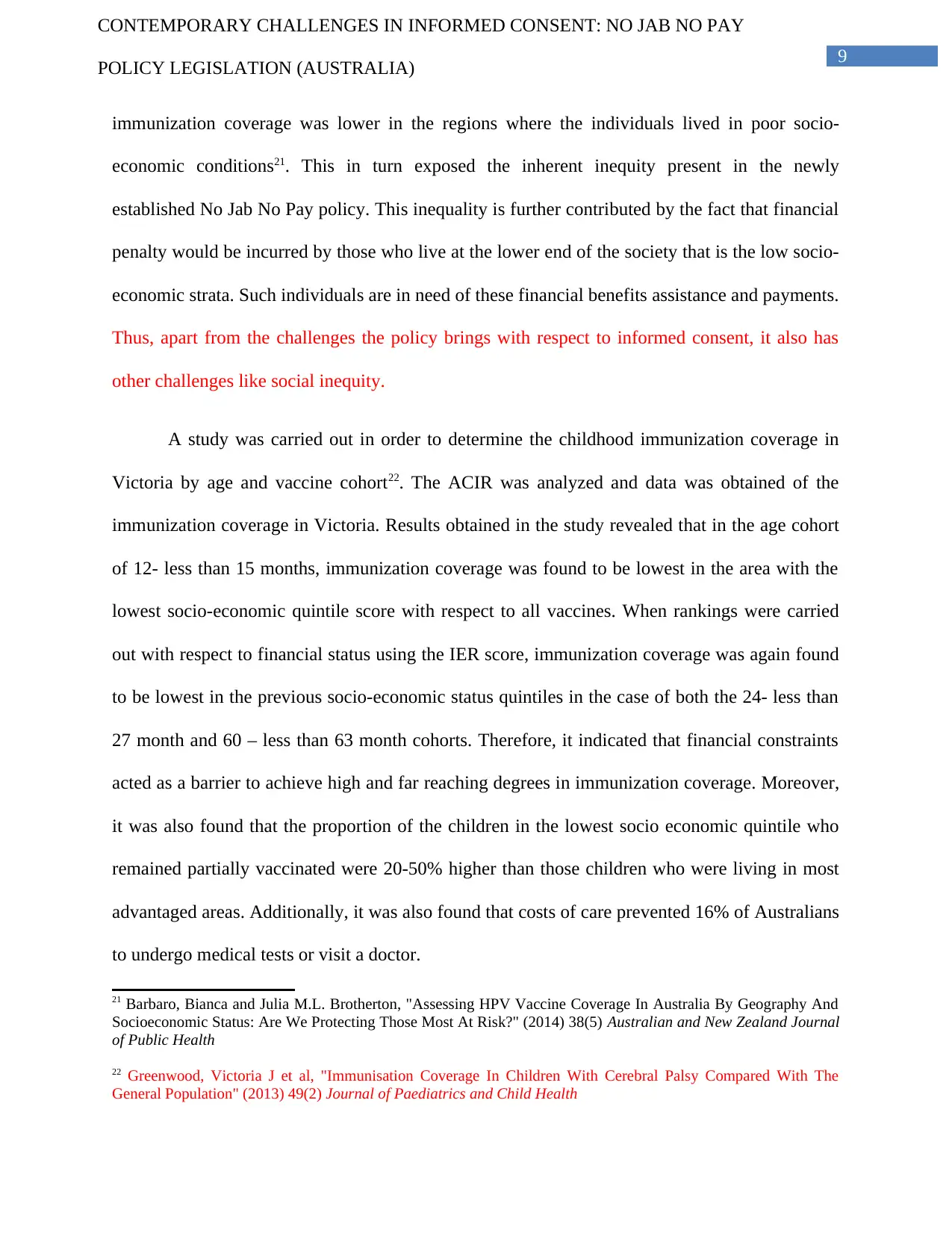
9
CONTEMPORARY CHALLENGES IN INFORMED CONSENT: NO JAB NO PAY
POLICY LEGISLATION (AUSTRALIA)
immunization coverage was lower in the regions where the individuals lived in poor socio-
economic conditions21. This in turn exposed the inherent inequity present in the newly
established No Jab No Pay policy. This inequality is further contributed by the fact that financial
penalty would be incurred by those who live at the lower end of the society that is the low socio-
economic strata. Such individuals are in need of these financial benefits assistance and payments.
Thus, apart from the challenges the policy brings with respect to informed consent, it also has
other challenges like social inequity.
A study was carried out in order to determine the childhood immunization coverage in
Victoria by age and vaccine cohort22. The ACIR was analyzed and data was obtained of the
immunization coverage in Victoria. Results obtained in the study revealed that in the age cohort
of 12- less than 15 months, immunization coverage was found to be lowest in the area with the
lowest socio-economic quintile score with respect to all vaccines. When rankings were carried
out with respect to financial status using the IER score, immunization coverage was again found
to be lowest in the previous socio-economic status quintiles in the case of both the 24- less than
27 month and 60 – less than 63 month cohorts. Therefore, it indicated that financial constraints
acted as a barrier to achieve high and far reaching degrees in immunization coverage. Moreover,
it was also found that the proportion of the children in the lowest socio economic quintile who
remained partially vaccinated were 20-50% higher than those children who were living in most
advantaged areas. Additionally, it was also found that costs of care prevented 16% of Australians
to undergo medical tests or visit a doctor.
21 Barbaro, Bianca and Julia M.L. Brotherton, "Assessing HPV Vaccine Coverage In Australia By Geography And
Socioeconomic Status: Are We Protecting Those Most At Risk?" (2014) 38(5) Australian and New Zealand Journal
of Public Health
22 Greenwood, Victoria J et al, "Immunisation Coverage In Children With Cerebral Palsy Compared With The
General Population" (2013) 49(2) Journal of Paediatrics and Child Health
CONTEMPORARY CHALLENGES IN INFORMED CONSENT: NO JAB NO PAY
POLICY LEGISLATION (AUSTRALIA)
immunization coverage was lower in the regions where the individuals lived in poor socio-
economic conditions21. This in turn exposed the inherent inequity present in the newly
established No Jab No Pay policy. This inequality is further contributed by the fact that financial
penalty would be incurred by those who live at the lower end of the society that is the low socio-
economic strata. Such individuals are in need of these financial benefits assistance and payments.
Thus, apart from the challenges the policy brings with respect to informed consent, it also has
other challenges like social inequity.
A study was carried out in order to determine the childhood immunization coverage in
Victoria by age and vaccine cohort22. The ACIR was analyzed and data was obtained of the
immunization coverage in Victoria. Results obtained in the study revealed that in the age cohort
of 12- less than 15 months, immunization coverage was found to be lowest in the area with the
lowest socio-economic quintile score with respect to all vaccines. When rankings were carried
out with respect to financial status using the IER score, immunization coverage was again found
to be lowest in the previous socio-economic status quintiles in the case of both the 24- less than
27 month and 60 – less than 63 month cohorts. Therefore, it indicated that financial constraints
acted as a barrier to achieve high and far reaching degrees in immunization coverage. Moreover,
it was also found that the proportion of the children in the lowest socio economic quintile who
remained partially vaccinated were 20-50% higher than those children who were living in most
advantaged areas. Additionally, it was also found that costs of care prevented 16% of Australians
to undergo medical tests or visit a doctor.
21 Barbaro, Bianca and Julia M.L. Brotherton, "Assessing HPV Vaccine Coverage In Australia By Geography And
Socioeconomic Status: Are We Protecting Those Most At Risk?" (2014) 38(5) Australian and New Zealand Journal
of Public Health
22 Greenwood, Victoria J et al, "Immunisation Coverage In Children With Cerebral Palsy Compared With The
General Population" (2013) 49(2) Journal of Paediatrics and Child Health
Paraphrase This Document
Need a fresh take? Get an instant paraphrase of this document with our AI Paraphraser
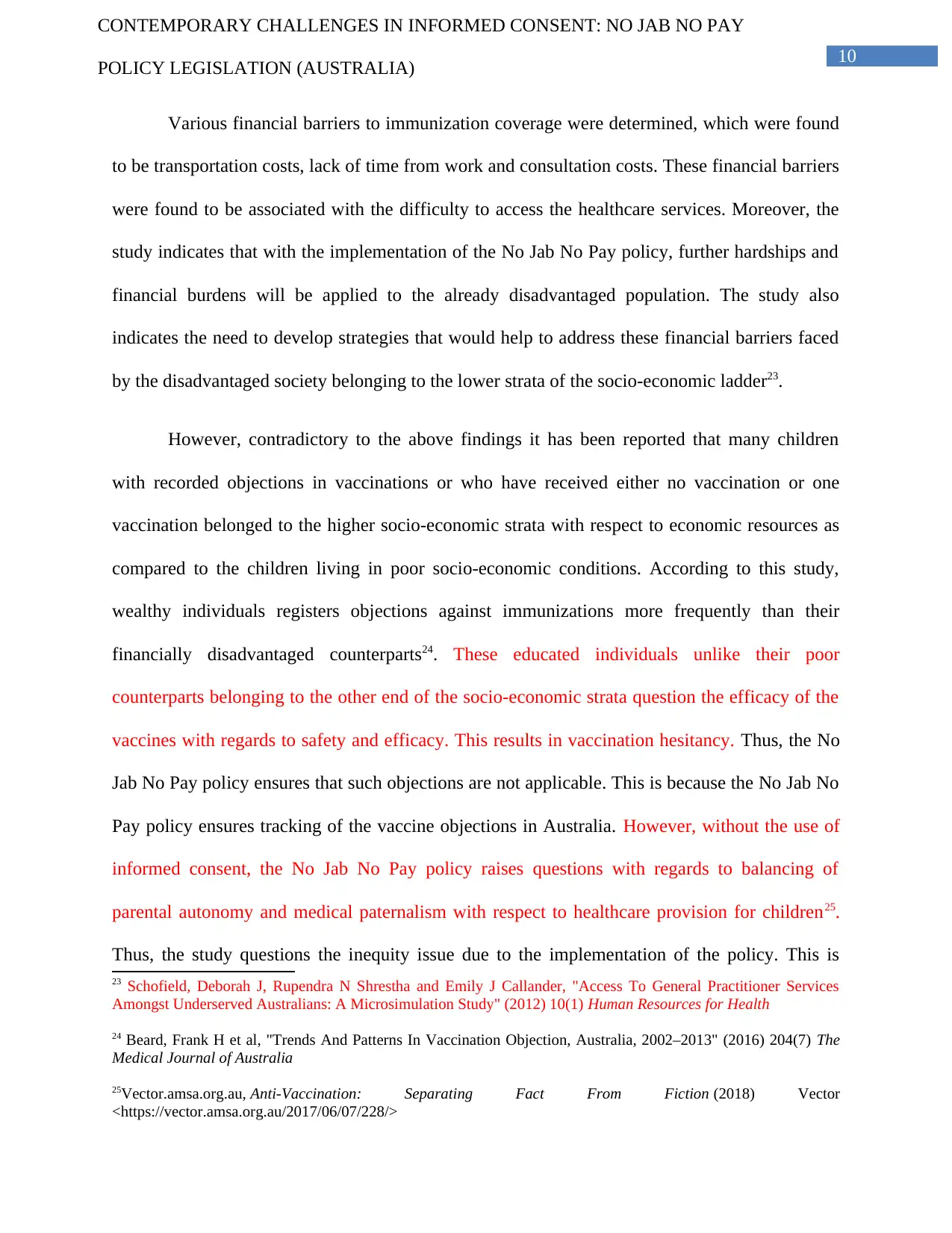
10
CONTEMPORARY CHALLENGES IN INFORMED CONSENT: NO JAB NO PAY
POLICY LEGISLATION (AUSTRALIA)
Various financial barriers to immunization coverage were determined, which were found
to be transportation costs, lack of time from work and consultation costs. These financial barriers
were found to be associated with the difficulty to access the healthcare services. Moreover, the
study indicates that with the implementation of the No Jab No Pay policy, further hardships and
financial burdens will be applied to the already disadvantaged population. The study also
indicates the need to develop strategies that would help to address these financial barriers faced
by the disadvantaged society belonging to the lower strata of the socio-economic ladder23.
However, contradictory to the above findings it has been reported that many children
with recorded objections in vaccinations or who have received either no vaccination or one
vaccination belonged to the higher socio-economic strata with respect to economic resources as
compared to the children living in poor socio-economic conditions. According to this study,
wealthy individuals registers objections against immunizations more frequently than their
financially disadvantaged counterparts24. These educated individuals unlike their poor
counterparts belonging to the other end of the socio-economic strata question the efficacy of the
vaccines with regards to safety and efficacy. This results in vaccination hesitancy. Thus, the No
Jab No Pay policy ensures that such objections are not applicable. This is because the No Jab No
Pay policy ensures tracking of the vaccine objections in Australia. However, without the use of
informed consent, the No Jab No Pay policy raises questions with regards to balancing of
parental autonomy and medical paternalism with respect to healthcare provision for children25.
Thus, the study questions the inequity issue due to the implementation of the policy. This is
23 Schofield, Deborah J, Rupendra N Shrestha and Emily J Callander, "Access To General Practitioner Services
Amongst Underserved Australians: A Microsimulation Study" (2012) 10(1) Human Resources for Health
24 Beard, Frank H et al, "Trends And Patterns In Vaccination Objection, Australia, 2002–2013" (2016) 204(7) The
Medical Journal of Australia
25Vector.amsa.org.au, Anti-Vaccination: Separating Fact From Fiction (2018) Vector
<https://vector.amsa.org.au/2017/06/07/228/>
CONTEMPORARY CHALLENGES IN INFORMED CONSENT: NO JAB NO PAY
POLICY LEGISLATION (AUSTRALIA)
Various financial barriers to immunization coverage were determined, which were found
to be transportation costs, lack of time from work and consultation costs. These financial barriers
were found to be associated with the difficulty to access the healthcare services. Moreover, the
study indicates that with the implementation of the No Jab No Pay policy, further hardships and
financial burdens will be applied to the already disadvantaged population. The study also
indicates the need to develop strategies that would help to address these financial barriers faced
by the disadvantaged society belonging to the lower strata of the socio-economic ladder23.
However, contradictory to the above findings it has been reported that many children
with recorded objections in vaccinations or who have received either no vaccination or one
vaccination belonged to the higher socio-economic strata with respect to economic resources as
compared to the children living in poor socio-economic conditions. According to this study,
wealthy individuals registers objections against immunizations more frequently than their
financially disadvantaged counterparts24. These educated individuals unlike their poor
counterparts belonging to the other end of the socio-economic strata question the efficacy of the
vaccines with regards to safety and efficacy. This results in vaccination hesitancy. Thus, the No
Jab No Pay policy ensures that such objections are not applicable. This is because the No Jab No
Pay policy ensures tracking of the vaccine objections in Australia. However, without the use of
informed consent, the No Jab No Pay policy raises questions with regards to balancing of
parental autonomy and medical paternalism with respect to healthcare provision for children25.
Thus, the study questions the inequity issue due to the implementation of the policy. This is
23 Schofield, Deborah J, Rupendra N Shrestha and Emily J Callander, "Access To General Practitioner Services
Amongst Underserved Australians: A Microsimulation Study" (2012) 10(1) Human Resources for Health
24 Beard, Frank H et al, "Trends And Patterns In Vaccination Objection, Australia, 2002–2013" (2016) 204(7) The
Medical Journal of Australia
25Vector.amsa.org.au, Anti-Vaccination: Separating Fact From Fiction (2018) Vector
<https://vector.amsa.org.au/2017/06/07/228/>
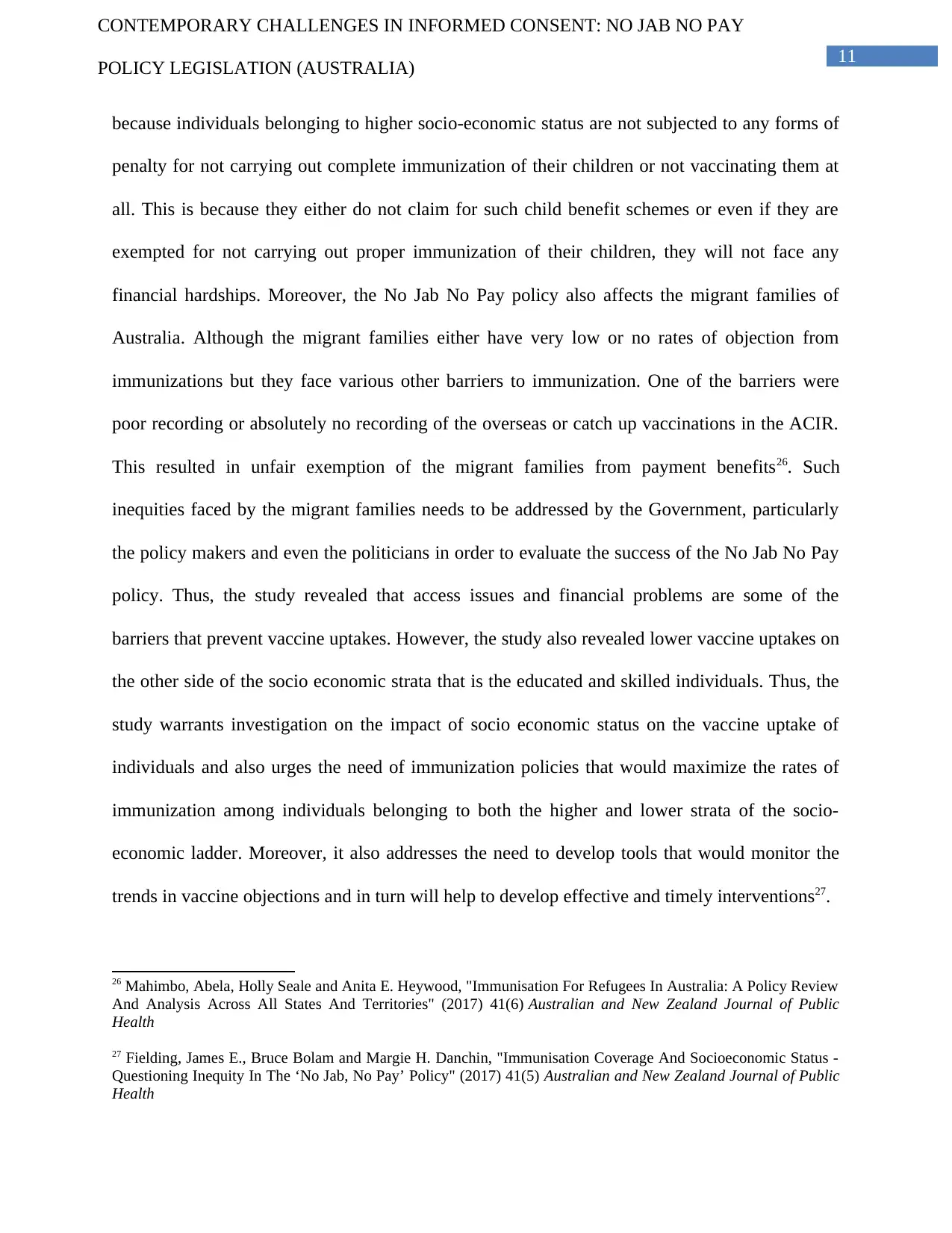
11
CONTEMPORARY CHALLENGES IN INFORMED CONSENT: NO JAB NO PAY
POLICY LEGISLATION (AUSTRALIA)
because individuals belonging to higher socio-economic status are not subjected to any forms of
penalty for not carrying out complete immunization of their children or not vaccinating them at
all. This is because they either do not claim for such child benefit schemes or even if they are
exempted for not carrying out proper immunization of their children, they will not face any
financial hardships. Moreover, the No Jab No Pay policy also affects the migrant families of
Australia. Although the migrant families either have very low or no rates of objection from
immunizations but they face various other barriers to immunization. One of the barriers were
poor recording or absolutely no recording of the overseas or catch up vaccinations in the ACIR.
This resulted in unfair exemption of the migrant families from payment benefits26. Such
inequities faced by the migrant families needs to be addressed by the Government, particularly
the policy makers and even the politicians in order to evaluate the success of the No Jab No Pay
policy. Thus, the study revealed that access issues and financial problems are some of the
barriers that prevent vaccine uptakes. However, the study also revealed lower vaccine uptakes on
the other side of the socio economic strata that is the educated and skilled individuals. Thus, the
study warrants investigation on the impact of socio economic status on the vaccine uptake of
individuals and also urges the need of immunization policies that would maximize the rates of
immunization among individuals belonging to both the higher and lower strata of the socio-
economic ladder. Moreover, it also addresses the need to develop tools that would monitor the
trends in vaccine objections and in turn will help to develop effective and timely interventions27.
26 Mahimbo, Abela, Holly Seale and Anita E. Heywood, "Immunisation For Refugees In Australia: A Policy Review
And Analysis Across All States And Territories" (2017) 41(6) Australian and New Zealand Journal of Public
Health
27 Fielding, James E., Bruce Bolam and Margie H. Danchin, "Immunisation Coverage And Socioeconomic Status -
Questioning Inequity In The ‘No Jab, No Pay’ Policy" (2017) 41(5) Australian and New Zealand Journal of Public
Health
CONTEMPORARY CHALLENGES IN INFORMED CONSENT: NO JAB NO PAY
POLICY LEGISLATION (AUSTRALIA)
because individuals belonging to higher socio-economic status are not subjected to any forms of
penalty for not carrying out complete immunization of their children or not vaccinating them at
all. This is because they either do not claim for such child benefit schemes or even if they are
exempted for not carrying out proper immunization of their children, they will not face any
financial hardships. Moreover, the No Jab No Pay policy also affects the migrant families of
Australia. Although the migrant families either have very low or no rates of objection from
immunizations but they face various other barriers to immunization. One of the barriers were
poor recording or absolutely no recording of the overseas or catch up vaccinations in the ACIR.
This resulted in unfair exemption of the migrant families from payment benefits26. Such
inequities faced by the migrant families needs to be addressed by the Government, particularly
the policy makers and even the politicians in order to evaluate the success of the No Jab No Pay
policy. Thus, the study revealed that access issues and financial problems are some of the
barriers that prevent vaccine uptakes. However, the study also revealed lower vaccine uptakes on
the other side of the socio economic strata that is the educated and skilled individuals. Thus, the
study warrants investigation on the impact of socio economic status on the vaccine uptake of
individuals and also urges the need of immunization policies that would maximize the rates of
immunization among individuals belonging to both the higher and lower strata of the socio-
economic ladder. Moreover, it also addresses the need to develop tools that would monitor the
trends in vaccine objections and in turn will help to develop effective and timely interventions27.
26 Mahimbo, Abela, Holly Seale and Anita E. Heywood, "Immunisation For Refugees In Australia: A Policy Review
And Analysis Across All States And Territories" (2017) 41(6) Australian and New Zealand Journal of Public
Health
27 Fielding, James E., Bruce Bolam and Margie H. Danchin, "Immunisation Coverage And Socioeconomic Status -
Questioning Inequity In The ‘No Jab, No Pay’ Policy" (2017) 41(5) Australian and New Zealand Journal of Public
Health
⊘ This is a preview!⊘
Do you want full access?
Subscribe today to unlock all pages.

Trusted by 1+ million students worldwide
1 out of 22
Related Documents
Your All-in-One AI-Powered Toolkit for Academic Success.
+13062052269
info@desklib.com
Available 24*7 on WhatsApp / Email
![[object Object]](/_next/static/media/star-bottom.7253800d.svg)
Unlock your academic potential
Copyright © 2020–2026 A2Z Services. All Rights Reserved. Developed and managed by ZUCOL.





